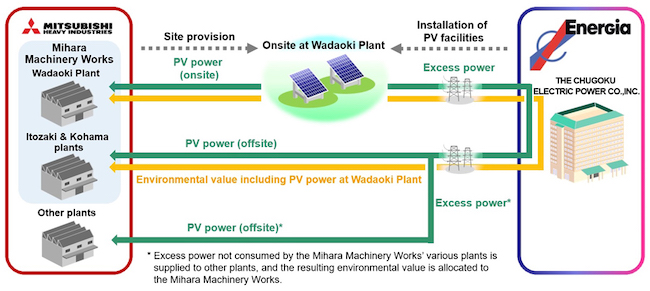
TOKYO, Jun 23, 2022 - (JCN Newswire) - Mitsubishi Heavy Industries, Ltd. (MHI) and The Chugoku Electric Power Co., Inc. (Chugoku Electric), which is based in Hiroshima, today concluded a basic agreement under which all electricity consumed at MHI's Mihara Machinery Works (Mihara, Hiroshima) will be replaced with green power, etc. derived from renewable energy sources by the end of fiscal 2023 (March 31, 2024).
 |
Under the agreement, Chugoku Electric will newly install 10-megawatt (MW) class photovoltaic (PV) facilities at the Mihara Machinery Works' Wadaoki Plant, and will supply green power, etc. to MHI under a combination of onsite and offsite power purchase agreements (PPAs)(1). The environmental value created by the PV facilities at the Wadaoki Plant will be applied to achieve full decarbonization throughout the Mihara Machinery Works, including its Itozaki and Kohama plants. When completed, the scheme - which is the first of its kind undertaken by either of the two project partners - will result in a near 10,000-ton annual reduction in the Mihara Machinery Works' carbon emissions.
Under the project scheme, the power generated by the PV facilities at the Wadaoki Plant will initially be used in-house at the plant, through the PPA onsite as specified. Any excess power will be supplied through the power grid to the Itozaki and Kohama plants, under an offsite PPA.
Additionally, any surplus power unused by the Mihara Machinery Works' three plants will be supplied to other MHI plants. The environmental value of the power supplied to other plants will be allocated to power supplied by Chugoku Electric(2) to meet the Mihara Machinery Works' nighttime demand, etc.(3) As a result, all power used at the Mihara Machinery Works will be replaced by green power, etc. making use of the environmental value derived from the Wadaoki Plant.
Going forward, MHI and Chugoku Electric will each make use of the expertise acquired under this project, and they will also pursue further collaboration in developing and proposing new solutions for achieving carbon neutrality.
(1) Under an onsite PPA, the PPA contractee has PV facilities installed on its premises, factory roof, etc. and the power produced is used within the site. Under an offsite PPA, the power generated on the PPA contractee's site is distributed to facilities at the company's other site or sites and supplied by retail power providers.
(2) This power is generated by facilities other than the PV facilities at the Wadaoki Plant (renewable energy power plants owned by Chugoku Electric, etc.).
(3) Nighttime and corresponding demand refers to power demand during time frames when PV facilities produce no power.
Copyright 2022 JCN Newswire. All rights reserved. www.jcnnewswire.com





